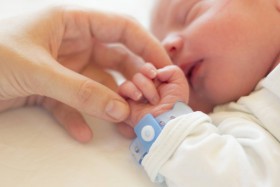Erb’s Palsy Treatment & Support for Your Child

When a baby comes into the world, one of the first things a new parent wants to do is hold their child’s little hand. But if a child has sustained an injury known as Erb’s palsy during birth, you might notice something unusual about the baby’s hand, arm, or shoulder.
What is Erb’s Palsy?
Erb’s palsy is a relatively rare type of birth injury, occurring in about 1-2 out of every 1,000 births. It’s a type of brachial plexus injury which involves damage to upper nerves near the neck that control movement and sensation in the shoulder, arm, hand, and fingers. Most commonly, Erb’s palsy occurs when a baby’s head and neck are pulled to the side during delivery, such as when shoulder dystocia is involved, or in breech births when a child’s arms are stretched over their head during delivery.
Like many other types of birth injuries, Erb’s palsy can range in severity. There are different types of injuries that can happen to this network of nerves and the exact type of injury will have a major impact on the type of treatment required. For example, neurapraxia is when a nerve is stretched, but not torn and will generally heal on its own. But in cases of rupture or avulsion, nerves are torn and will need surgery.
Treatment Options for Erb’s Palsy
Physical therapy is a very common treatment for Erb’s palsy and is often the first line of treatment when cases aren’t clearly severe enough to require surgery. Physical therapy can be started very early in life, with parents helping children who are just a few weeks or months old perform exercises that can help improve range of motion in arms and prevent joint contracture. If a few months pass and physical therapy doesn’t seem to be helping, surgery may be needed to help the child. Occupational therapy can also help children with more severe forms of Erb’s palsy.
The Effects of Erb’s Palsy
The exact type of injury involved will also play a role in how the injury impacts the child’s life. In mild cases, a child might experience some stinging or burning in their arm, but more severe cases can have effects like difficulty performing certain tasks or having one arm that’s shorter than the other because of the impacted arm’s growth being stunted.
Support for Those Impacted by Erb’s Palsy
If your child has a more severe form of Erb’s palsy that will have a long-term effect on their life, don’t forget to make sure they have the emotional support they need. As a child grows older, they might become insecure about things like having one arm that is shorter than the other or about the fact that they have a difficult time doing things that come easily to other kids. They might also feel like they have been punished for something they have done wrong. For many children with Erb’s palsy, seeing a therapist can help them understand and come to terms with their injury and cope with self-esteem issues. Also, be sure to focus on the positive things in the child’s life. For example, If they’re feeling frustrated because they’re having a hard time doing something, remind them of some things they can do well.
When you have a child who needs special medical attention, it can be easy to focus on their needs and lose sight of taking care of yourself. But as you take care of a child with Erb’s palsy, it can be very beneficial to speak to other parents who are in the same position. Try asking your doctor or hospital if there are any local support groups for parents of children with Erb’s palsy. Or take a look around online for any web forums or Facebook groups for parents of children impacted by Erb’s palsy. The United Brachial Plexus Network, for example, has a Facebook group where people are able to ask questions and speak about their experiences.
Get Help from a Birth Trauma Lawyer
If your child has Erb’s palsy, speak to a birth trauma lawyer as soon as possible to find out what your legal options are. When a child needs surgery or will have long-term effects as a result of their injury, it’s important to make sure they will be taken care of. Not only is it possible that your child’s injury could have been prevented, it’s also very common for insurance companies to try and deny coverage for treatment of brachial plexus injuries. A birth trauma lawyer will be able to help make sure your child gets the care they need.
At Goodwin & Scieszka, you’ll be able to get help from a Michigan-based lawyer experienced in helping the victims of birth trauma. Contact us today to get started.






